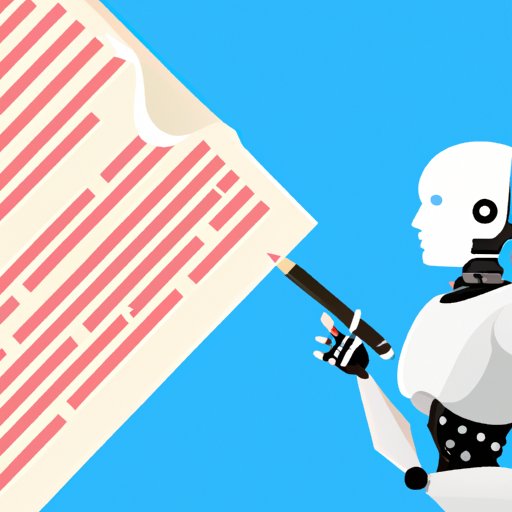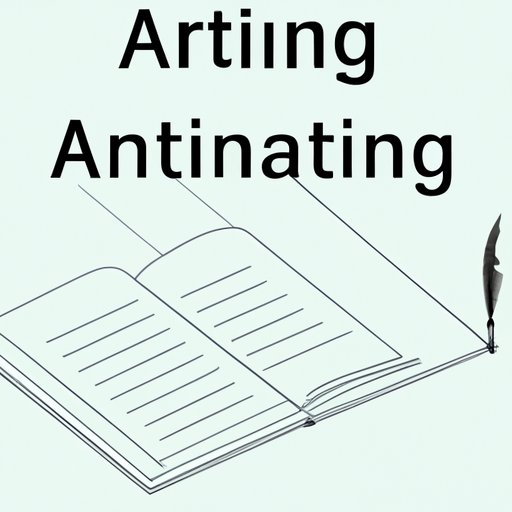Introduction
Artificial intelligence (AI) is an ever-evolving technology that has the potential to revolutionize many aspects of our lives. From self-driving cars to voice assistants, AI is being used in a variety of ways to make our lives easier. One area that has been gaining traction recently is AI-written novels. The idea of using AI to write books is both intriguing and controversial, and it raises some important questions about the future of writing and publishing.
In this article, we will explore the potential of AI to write novels. We will examine the ethical considerations, impact on the publishing industry, pros and cons, challenges in teaching AI to write, and the quality of AI-written novels.

Examining the Potential of AI to Write Novels
When it comes to AI writing novels, there are two main questions: what can AI do and how can it help writers and publishers? To answer these questions, let’s take a look at what AI can do in terms of novel writing.
AI has the potential to generate plotlines, characters, and settings for stories. It can also be used to analyze data related to readers’ preferences and use the data to create stories tailored to their tastes. Additionally, AI can be used to automatically edit manuscripts and suggest changes to improve readability.
How can AI help writers and publishers? AI can be used to automate mundane tasks such as proofreading and editing, freeing up time for writers to focus on creative tasks. For publishers, AI can be used to identify trends in reader preferences and provide insights into which stories will be successful.

The Ethics Behind Using AI to Write Novels
When discussing the potential of AI to write novels, it’s important to consider the moral implications of using AI to write stories. Is it ethical to allow AI to compose literature when humans are capable of doing it?
Another concern is the potential for AI to take away jobs from human writers. While AI can automate mundane tasks like proofreading, it can also be used to generate entire stories, potentially eliminating the need for human writers.
Analyzing the Impact of AI-Written Novels on Publishing Industry
If AI-written novels become popular, what kind of impact will they have on the publishing industry? Let’s take a look at both the advantages and disadvantages for the industry.
One advantage is that AI could help publishers identify profitable stories more quickly and accurately. AI could also be used to automate mundane tasks like editing and proofreading, reducing costs for publishers.
On the other hand, there are potential drawbacks to using AI to write novels. One is that AI-written books may not appeal to traditional readers, who may prefer stories written by humans. Additionally, AI-written books may not be as emotionally engaging as those written by humans.
Exploring the Pros and Cons of AI Writing Novels
Now that we’ve looked at the potential impact of AI-written novels on the publishing industry, let’s examine the pros and cons of using AI to write stories.
One benefit is that AI-written novels could be faster and cheaper to produce than those written by humans. Additionally, AI-written novels could be tailored to readers’ preferences more accurately than those written by humans.
On the other hand, there are some drawbacks to using AI to write novels. One is that AI-written stories may lack the emotional depth and complexity of those written by humans. Additionally, there is the risk that AI-written stories could become formulaic and predictable.

Investigating the Challenges of Teaching AI to Write Novels
Teaching AI to write novels is no easy task. There are several technical hurdles that must be overcome before AI can generate compelling stories. One challenge is understanding complex language and emotions. AI must be able to comprehend subtle nuances in language in order to generate believable stories.
Another challenge is teaching AI to generate original ideas. AI must be able to come up with fresh plotlines and characters in order for its stories to stand out from the rest.
Assessing the Quality of AI-Written Novels
So, how good are AI-written novels? The current state of AI-written novels is mixed. While some AI-generated stories have received positive reviews, others have been criticized for being formulaic and unoriginal.
Another challenge is judging the quality of AI-written stories. This is a difficult task because it requires understanding the nuances of language and emotion, something that AI is still developing.
Conclusion
In conclusion, AI has the potential to revolutionize the writing and publishing industries. However, there are a number of ethical, practical, and technical challenges that must be addressed before AI-written novels can become mainstream. Additionally, judging the quality of AI-written stories is a difficult task, as it requires an understanding of complex language and emotion.
It remains to be seen whether AI-written novels will become popular, but one thing is certain: AI is sure to have a profound impact on the writing and publishing industries in the years to come.
(Note: Is this article not meeting your expectations? Do you have knowledge or insights to share? Unlock new opportunities and expand your reach by joining our authors team. Click Registration to join us and share your expertise with our readers.)
